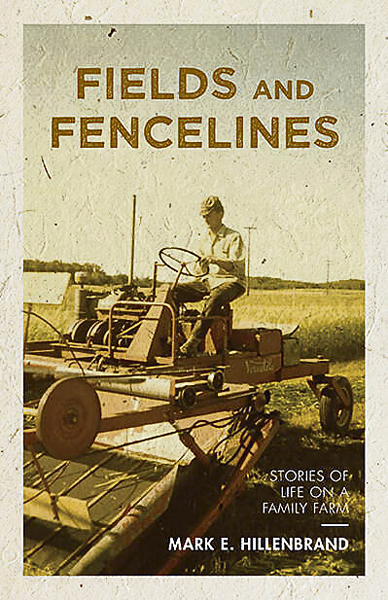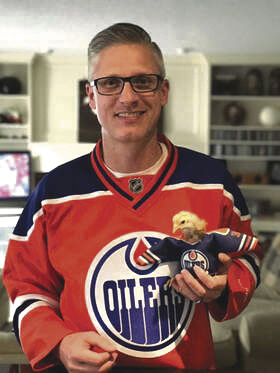
All Mark Hillenbrand wanted to be when he grew up was a farmer.
Growing up on the family farm near Shellbrook, they had a big garden and butchered their own chickens and beef. It was a family farm in the truest sense.
“It was still a very holistic, organic sort of experience,” Hillenbrand said.
“We all worked. Me and my sisters got up every day and worked and contributed towards this pursuit we were going after as a family.”
While he wanted to keep the family farm going, life didn’t turn out that way. The operation was becoming more capital intensive and to stay would have been impossible.
“Running off to university and getting a law degree was meant to be this temporary hiatus to raise the money and come back. The way life went, that never happened.”
While Hillenbrand has now been a big city lawyer for over 20 years, he still identified as a farm boy at heart. That’s part of the reason that, since law school, he’s been putting his experiences to paper. Hillenbrand recently released his first book, Fields and Fencelines, a memoir of his experiences growing up on the family farm south of Shellbrook. The book has received a five-star rating from Clarion Review.
Hillenbrand never set out to write a book.
“It started as an essay I wrote in law school,” he explained.
“I took an agriculture law class, and we were encouraged to draw from our personal experiences in agriculture, and I incorporated a few stories about the farm and what it meant to me. The professor was complimentary and encouraged me to continue the story, so I did, chipping away at it for the next 20 years.”
Hillenbrand sees himself as part of the last generation to be raised on a true family farm.
“I mean as the economics of scale have changes and agriculture has changed, it’s really business driven now,” he said.
“It was all of that, and all of the emotions of dealing with (the farm) that led me to continue working on it and finally finish this bucket list goal of mine.”
The farm Hillenbrand grew up on is no longer in his family. They had it for 62 years. But his dad was diagnosed with cancer, and they had to sell the farm through an auction.
“That was a very emotional thing to do,” Hillenbrand said. “Some of the things were pretty emotional. The farm becomes an extension of your family. It’s a difficult thing to see that go.”

Hillenbrand’s book does cover that process of saying goodbye to the farm that, for so many years, defined his family’s legacy. But it also touches on what it was like growing up on that farm, including the day-to-day of fixing combines or castrating cattle.
“My goal was, first and foremost, to record the history. As a kid, growing up, I loved the Laura Ingalls Wilder series. The one book was called Farmer Boy, about her husband growing up on the farm, and I found it fascinating as a kid. Part of it is trying to give people a little bit of insight about what it’s like to live on a farm.”
The experience of going through all of that again for the sake of writing the book wasn’t always easy.
“It was this cathartic thing to sit down and go through those memories and those experiences and putting it on paper. When I was writing it, I wasn’t even necessarily thinking I was going to publish it. It was just the process of spitting it out,” Hillenbrand said.
“There was definitely a tear shed putting that together because I wanted it to be an authentic expression of what it felt like.”
That approach, so far, has resonated with people.
While the book hasn’t been out for long, Hillenbrand has already had feedback from other people who grew up on the family farm and who have gone through the same things he has, including the process of saying goodbye.
“People might not understand, but if you’ve lived it, or if your family has had any kind of business together, you get it. It’s not just a job. It’s something the family identifies with,” he said.
“It’s like with anything, the world changes and evolves. But I think it’s too bad if you look at what’s happening., the number of farmers and that traditional approach doesn’t work anymore. From an economic point of view, you’re seeing this huge exodus to urban centres. I feel that my book captures that last sort of point in our history as a country when that was still what a farm was.”
Those lessons learned on the farm have helped Hillenbrand later in life, even as a lawyer.
“I’m living in Edmonton now, but I still identify as a Saskatchewan farm kid. A lot of the success I’ve had in law ties back to the lessons of the farm, as far as work ethic and a stoic approach to life. Those are sorts of unique cultural experiences that you only get in that environment,” he said.
Hillenbrand’s book is available through Amazon, Friesen Press, Barnes & Noble and Chapters/Indigo. It’s also available for e-readers and can be ordered by many major bookstores.
While the book is particularly impactful for anyone who has lived on a farm, Hillenbrand thinks just about anyone can connect with his story.
“I’ve had numerous people reach out, and people that don’t even have a farm connection,” he said.
“I think the audience that’s going to be most tuned into it are those who can relate directly, but if anybody has an interest in agriculture and what it meant to our province and our country — I think there’s an overall kind of lesson to it and some of the wisdom of (the farm) I’ve tried to insert in the stories.
“I would hope it’s kind of relatable to anybody that would pick it up.”
